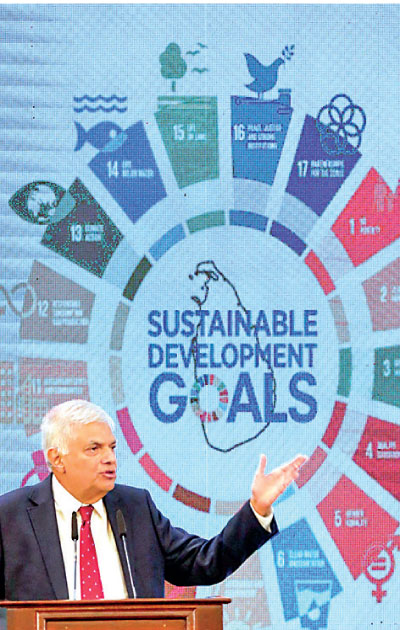Monday Feb 16, 2026
Monday Feb 16, 2026
Thursday, 31 August 2023 03:06 - - {{hitsCtrl.values.hits}}
 President Ranil Wickremesinghe assured Sri Lanka’s commitment to self-reliance, economic transformation and sustainable growth to thrive amidst the global uncertainties.
President Ranil Wickremesinghe assured Sri Lanka’s commitment to self-reliance, economic transformation and sustainable growth to thrive amidst the global uncertainties.
Speaking at a forum on Sri Lanka’s Sustainable Development Tra-jectories and Pathways, Wickremesinghe provided insights into the evolving global landscape and the country’s readiness to tackle pressing challenges.
He addressed the challenges and opportunities for achieving the SDGs, the impact of the Paris Climate Summit, the Glasgow Summit and the global debt crisis. He stressed the importance of a collective approach to navigate the complicated dynamics of the global stage.
Wickremesinghe highlighted the need to diversify financial resources beyond conventional channels. He also emphasised that Sri Lanka should expand its reliance beyond funding solely from multilateral development banks. Encouraging private sector engagement and attracting investments were identified as pivotal strategies to generate the essential capital required for sustainable development initiatives.
Amid economic challenges and the drive to enhance competitiveness, the President outlined proactive measures taken by Sri Lanka to transform its economy. Inspired by the successes of countries such as Thailand, Indonesia, and Vietnam, he said the country aims to attract foreign investments and leverage emerging markets to stimulate growth.
Wickremesinghe noted that Sri Lanka’s path to development would involve learning from successful models while striving for self-reliance.
Treasury Secretary and Sustainable Development Council Chairman Mahinda Siriwardane emphasised the importance of addressing fiscal constraints and debt issues to drive sustainable development. He highlighted the need for an additional $ 500 billion annually globally to support sustainable development efforts, while Sri Lanka also seeks significant resources for its recovery and long-term progress.
Siriwardane pointed to the alignment of environmental and social goals with government policies, including targets for poverty reduction and unemployment. He underscored the nation’s commitment to renewable energy, aiming to achieve 70% and 100% electricity from renewable sources by 2030 and 2050 respectively.
With an emphasis on inclusive and equitable development; initiatives like the Roadmap for Sustainable Finance, Green Finance Taxonomy, SDG Investor Map, and Green Bond Framework were highlighted as pivotal in integrating SDGs into the financial system.
President Wickremesinghe’s vision for self-reliance and sustainable growth, along with the commitment and collaborative efforts showcased at the forum, collectively set the stage for Sri Lanka’s journey towards a sustainable and prosperous future.
Sustainable Development Council Director-General Chamindry Saparamadu, United Nations Economic and Social Commission for Asia and the Pacific (UNESCAP) Statistical Data Management Unit Head Arman Bidarbakht Nia, United Nations Development Program (UNDP) Resident Representative Azusa Kubota, and United Nations (UN) in Sri Lanka Resident Coordinator Marc-André Franche, also spoke at this occasion.
UNESCAP Executive Secretary and UN Under-Secretary-General Armida Salsiah Alisjahbana, and UNDP Regional Bureau for Asia and the Pacific and UN Assistant Secretary-General KanniWignaraja also joined and delivered their messages via Zoom technology.
Prime Minister Dinesh Gunawardena, along with Ministers Ali Sabry, Pavithra Vanniarachchi, Mahinda Amaraweera, KeheliyaRambukwella, and State Ministers Shehan Semasinghe, GeethaKumarasinghe, as well as President’s Senior Advisor on Climate Change Ruwan Wijewardena, Central Bank Governor Dr.Nandalal Weerasinghe, Secretary to the Ministry of Environment Dr. Anil Jasinghe, and Secretary to the Ministry of Energy U.K. Mapa Pathirana, along with Country Director of the Sri Lanka Resident Mission of the Asian Development Bank (ADB) Takafumi Kadono, and Chief Representative of the Japan International Cooperation Agency (JICA) Sri Lanka, University Vice Chancellors, Heads of Private and Public sectors, and officials of the National Council of Sustainable Development were present at this occasion.